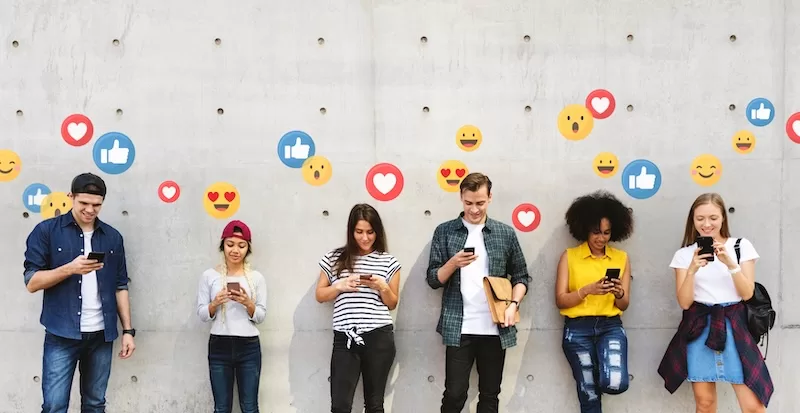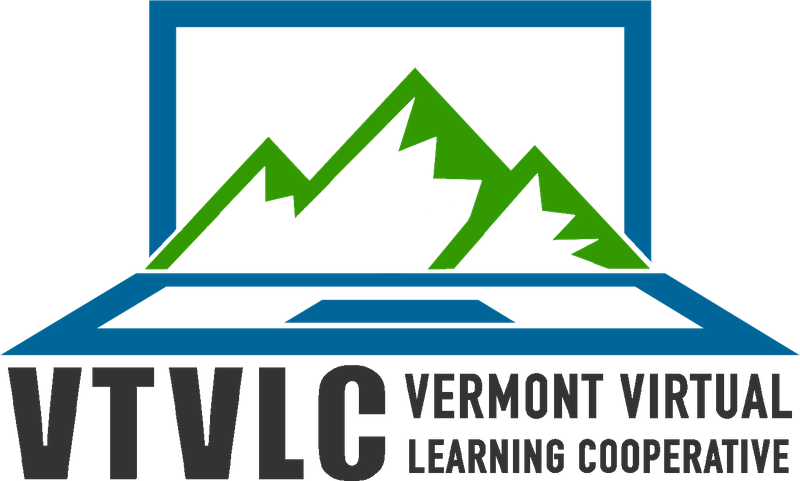The Importance of Digital Citizenship in an Online Class
Taking online classes at the Vermont Virtual Learning Cooperative (VTVLC) has numerous benefits: it allows students who may have scheduling conflicts or busy lives outside of school to take some of their courses asynchronously, it increases the number of courses students have access to, and it allows students to modulate their pace in a course as it fits with their needs.
But online courses are not merely a vehicle for increasing flexibility: online courses are uniquely equipped to provide students with 21st-century skills. Among these is cultivating an understanding of how to be a responsible, respectful, and safe digital citizen. Whether students are enrolled in a full-time online program, taking one or two traditional or on-demand courses, or diving into a hands-on CTE program like Digital Media Production, navigating the digital world with integrity is an essential skill beyond the classroom that prepares students for college, career, and their personal lives.

What Is Digital Citizenship?
Digital citizenship refers to the responsible use of technology and online platforms. It involves practicing ethical behavior, protecting your privacy, respecting others, and contributing positively to online communities.
At VTVLC, students interact in virtual classrooms through Canvas LMS, participate in discussion boards, communicate with teachers and peers via email and video conferencing, and submit digital assignments. All of these activities require students to engage thoughtfully, respectfully, and safely online.
Why Digital Citizenship Matters in Online Learning
1. Online Learning Is a Community
Even though students aren’t meeting in person, VTVLC classes are still collaborative learning environments. Students engage in group discussions and teacher check-ins. Practicing good digital citizenship helps create a safe and inclusive online space where everyone feels valued and heard.
When students practice kindness and respect in online interactions, it enhances collaboration and strengthens the learning experience for everyone.
2. Your Digital Footprint Matters
Every post, email, or comment leaves a trace—your digital footprint. In a school setting, this can affect how others perceive you and even impact future opportunities, such as college applications or job searches.
Practicing digital citizenship helps students learn to:
- Think critically about what they share
- Use respectful language
- Cite sources properly
- Strive for academic integrity
Tip: Before posting or submitting anything, ask: “Is this respectful, responsible, and appropriate?”
3. Building Future-Ready Skills
Today’s students are tomorrow’s leaders, professionals, and creators. Whether a student is planning to enter college or heading into the workforce, understanding how to communicate effectively and ethically online is a must-have skill.
Practicing digital citizenship prepares students to:
- Participate in professional virtual meetings
- Collaborate on shared documents and creative projects
- Navigate social media responsibly
- Write professional communications
- Uphold online etiquette in academic and professional settings
Learning to be a good digital citizen now builds lifelong habits that will serve students well beyond high school.
4. Online Safety and Privacy
In online learning, students share information and submit assignments through digital platforms. Practicing digital citizenship also means protecting personal information and being cautious about what you share online.
Online learning gives students hands-on opportunities to navigate the digital world and learn best practices such as how to:
- Create strong passwords
- Recognize phishing and scam attempts
- Keep personal details (like addresses and phone numbers) private
- Use technology in ways that protect themselves and others
Staying safe online is a shared responsibility, and it starts with awareness and smart choices. VTVLC also offers courses specifically grappling with online safety and privacy, such as Cybersecurity.
How VTVLC Encourages Digital Citizenship
At VTVLC, we understand that strong digital citizenship is foundational to successful online learning. That’s why we:
- Use Canvas LMS, which supports respectful communication and digital accountability
- Provide clear expectations and guidelines for student behavior in online courses
- Incorporate discussion-based assessments (DBAs) and one-on-one teacher
- interactions to support ethical and engaged learning
- Offer courses that integrate media literacy and digital responsibility
- Empower students with the flexibility to work independently, while helping them build responsible habits
Tips for Practicing Digital Citizenship in VTVLC Courses
- Use respectful language in discussion boards and messages
- Follow course rules and deadlines
- Follow the academic integrity policy
- Keep login information secure and private
- Cite your sources when using outside material
- Reach out to your teacher if you’re unsure about expectations
- Be mindful of tone. Words can be interpreted differently online
Remember: Even though you’re behind a screen, there’s a real person on the other side.
Final Thoughts
Online learning at VTVLC opens doors to flexibility, opportunity, and independence—and with that comes the responsibility to be a positive, thoughtful, and safe digital citizen. As students explore everything from algebra to African-American History, podcasting to AP Psychology, digital citizenship remains a central part of their success.
By embracing the principles of digital citizenship, students strengthen their voice, protect their privacy, and become leaders in the digital world.
Online learning is more than academics. It’s a chance to grow into a responsible, future-ready global citizen.

